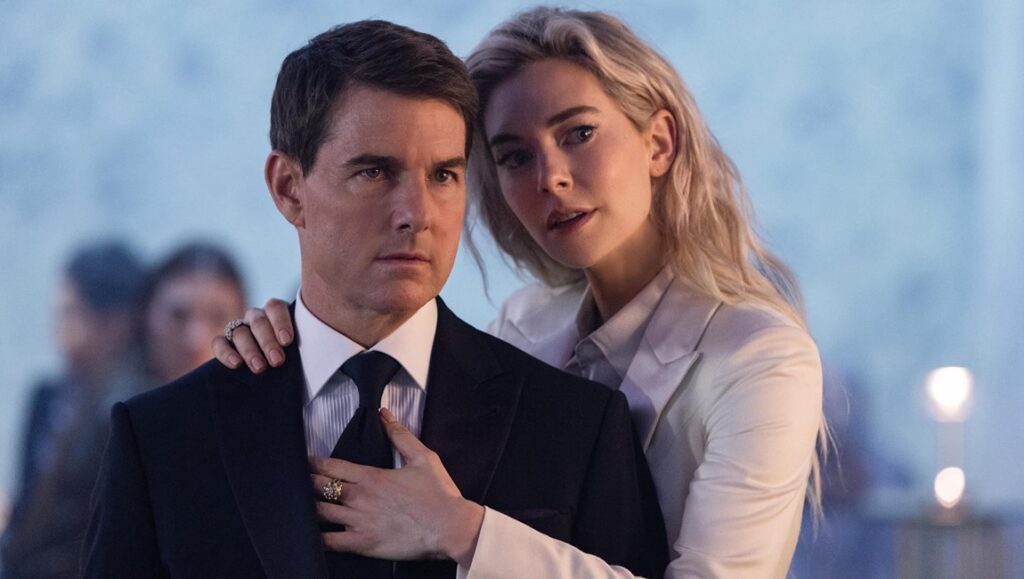Since the last Mission: Impossible movie, Fallout, was released in 2018, Tom Cruise has seemingly forced his superhero status into the real world by sheer force of will. (Maybe we should start a conspiracy theory about how Cruise caused the pandemic just to demonstrate the sheer awesome might of his power.) It worked, too. After dominating last year with Top Gun: Maverick, he’s now not just a great screen hero — he’s the savior of the movies, a champion for the theatrical experience, truly the world’s greatest showman.
So it makes sense that in Dead Reckoning Part One, the latest impossible mission, he’s literally fighting an algorithm. Dubbed “The Entity,” it’s a malicious AI that’s capable of controlling and deceiving entire governments, all of which would stop at nothing to in turn control it. All Ethan Hunt knows is that whoever possesses both halves of a special key can control The Entity. That’s basically all viewers need to know, too. As usual for a Mission movie, this latest entry is crammed with breathless info-dumping that hurtles through plot details so quickly that it’s easy to get confused, only you won’t since the key is such a perfect MacGuffin that it papers over every bit of iffy logic or unclear beat.
Also after the key: Ethan’s former IMF boss, Eugene Kittridge (Henry Czerny), returning from the very first installment, who has also sent two operators (Shea Whigham and Greg Tarzan Davis) to chase him down; clever pickpocket Grace (Haley Atwell); arms broker The White Widow (Vanessa Kirby), returning from Fallout; and a determined enemy from Ethan’s past, Gabriel (Esai Morales), a sort of the anti-Ethan Hunt who just wants to make sure The Entity has all the leeway it needs to destroy the world. Oh, and he’s joined by a wordless assassin, Paris (Pom Klementieff). Off we go.
The first hour of Dead Reckoning unfolds like it’s the Oceans Twelve of spy movies. It’s loaded with ruses within ruses, red herrings, callbacks to earlier installments — primarily Brian De Palma’s initial masterpiece, which this one resembles more than any other — character introductions, and expository speeches that constantly relocate us inside this endless series of fakeouts. The rest is narrative plate-spinning of the highest caliber, all the more astonishing for how effortless it all seems. But make no mistake, the bruising effort is all up there on the screen. An early set piece that features everyone scrambling through the Dubai airport in pursuit of Grace and the key toes the line between suspense and silliness so well that it almost lands in a place of elegance. A mid-movie bit of delightful auto-pinball in the streets of Rome delivers one of the best car chases in recent memory. Cruise’s much-hyped motorcycle cliff dive is even more breathtaking when viewed in its entirety.
And all of that before we even begin talking about the climactic train sequence: filmed entirely practically for the most part, and only somewhat augmented by digital VFX, it’s a stunningly economical and thrilling exhibition of action. Director Christopher McQuarrie continues to up the ante on spectacle across this sequence, even as he dials things back when it comes to flashy technique, preferring always to simply put the action and the actors performing it on display, as cleanly as possible. It’s an approach far easier said than done in this age of the CGI siren call, but the results speak for themselves. From a terrific fight scene on the roof of the speeding train, to the cars plummeting off a demolished bridge, to the literal cliffhanging climax, it’s pure, muscular Hollywood tradecraft sketched upon an enormous canvas. It’s tough to point to anything else out there like it.
Even better, Dead Reckoning is undeniably funny. Characters are constantly either stymied or stuck, endlessly frustrated by their ridiculous predicament and never failing to comment on it. Whigham’s spy tracker complains, exasperatedly, that Ethan is a “mind-reading, shape-shifting, incarnation of chaos.” Everyone chasing the stupid key through this pinball machine of a plot makes this the whole project feel like more of a caper comedy than an action thriller or a spy film — although it is still all of those things. Cruise once again, as a character in a previous entry put it, embodies the quality of “both arsonist and fireman,” only in this case metatextually, as one can see that he’s arguably the primary creative force in the production of these epics, even while they exist solely to platform his showmanship. It’s perhaps the sole liability of these movies that they insist on attempting some sort of emotional life for Ethan Hunt, as Cruise has long passed the point where he’s playing anyone but himself, forever and further blurring the lines between the screen and “real” versions of himself. Here, he’s literally saving the world of cinema.
Published as part of InRO Weekly — Volume 1, Issue 27


Comments are closed.